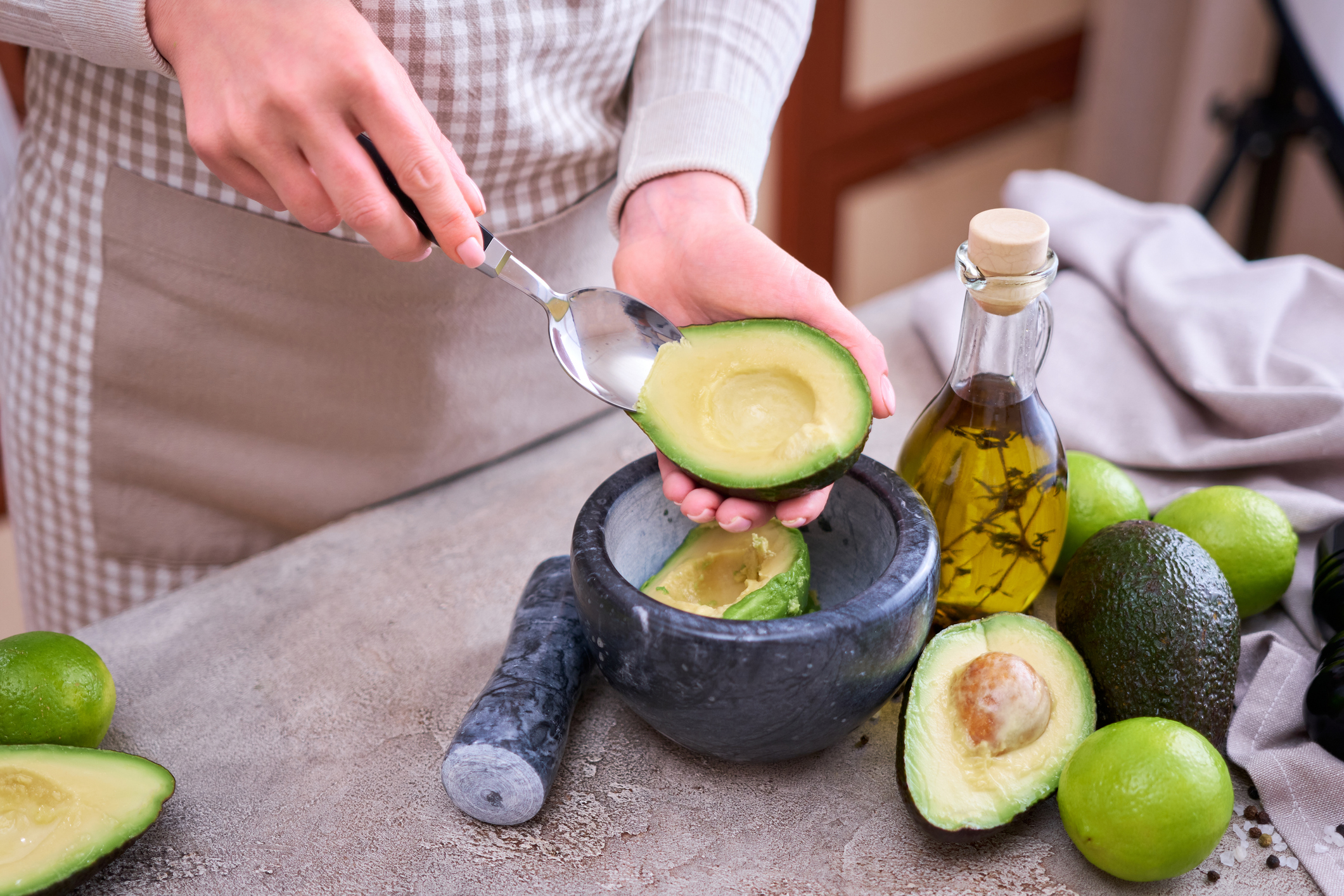Avocado intolerance refers to the body’s inability to properly digest avocados, causing unpleasant symptoms. While avocado allergy is relatively rare, many people experience some form of intolerance to this popular fruit. These symptoms can range from mild discomfort to severe digestive issues and may even lead to anaphylaxis in extreme cases.
In this article, we will discuss the common symptoms and causes of avocado intolerance, as well as management strategies to help those who are sensitive to this fruit. Also, we will explore some alternative options for avocado lovers who still want to enjoy the benefits of this nutritious fruit without experiencing discomfort.
Avocado intolerance is a condition in which the body has difficulty digesting avocados, causing various unpleasant symptoms. This can be due to different reasons such as an enzyme deficiency, sensitivity to certain compounds present in avocados, or underlying digestive issues. Unlike avocado allergy, which is caused by an immune system response to specific proteins found in avocados, avocado intolerance is a non-allergic reaction.
Also, it is essential to note that avocado intolerance is different from involves the inability to digest a specific sugar found in dairy products. With avocado intolerance, the issue lies in the body’s ability to break down and process avocados effectively.
Additionally, avocado intolerance can be either temporary or chronic. Temporary avocado intolerance may occur when someone eats a large amount of avocados in one sitting, overwhelming their digestive system. In this case, the symptoms usually subside after a few hours or days.
On the other hand, chronic avocado intolerance is when someone experiences recurring symptoms over an extended period. This could be due to an underlying digestive disorder or a more severe intolerance to avocados. In such cases, it is essential to seek medical advice for proper diagnosis and management.

Avocado intolerance can manifest in a variety of ways and differs from person to person. Some individuals may experience mild symptoms after consuming avocados, while others may have more severe reactions.
Common symptoms include:
Stomach pain and discomfort are common symptoms of avocado intolerance. This can range from a mild stomach ache to severe abdominal pain. The discomfort may also be accompanied by bloating, gas, and general digestive distress.
The main reason for this is the presence of oligosaccharides in avocados. These complex sugars can be difficult for some people to digest, leading to discomfort and pain in the stomach. Additionally, avocados are high in fiber, which can also cause digestive issues for those who are sensitive to it.
Plus, some individuals may have an underlying digestive condition, such as irritable bowel syndrome (IBS), which can be aggravated by consuming avocados. This can lead to more severe stomach pain and discomfort.
If you experience stomach pain and discomfort after eating avocados, it is important to listen to your body and avoid consuming them in the future. You may also want to consult with a doctor to rule out any underlying digestive issues and find ways to manage your symptoms.
Another common symptom of avocado intolerance is bloating and gas. This occurs when the body has difficulty breaking down the carbohydrates present in avocados, leading to an excess of gas production in the digestive tract.
Bloating can be uncomfortable and may cause your stomach to feel swollen or distended. Gas can also cause discomfort and may be accompanied by flatulence or belching. In some cases, excessive gas may lead to abdominal pain and cramping.
The best way to manage bloating and gas caused by avocado intolerance is to limit or avoid consuming avocados. Additionally, incorporating probiotic-rich foods into your diet can help improve digestion and reduce bloating and gas.
Nausea and vomiting are more severe symptoms of avocado intolerance. This can occur due to an adverse reaction to certain compounds present in avocados or an underlying digestive disorder.
Nausea is characterized by a feeling of queasiness or discomfort in the stomach, often accompanied by an urge to vomit. In some cases, consuming avocados may trigger actual vomiting, which can be unpleasant and may lead to dehydration.
If you experience nausea or vomiting after consuming avocados, it is essential to seek medical advice. Your doctor can help determine the cause of your symptoms and provide proper treatment.
Diarrhea is another common symptom of avocado intolerance. This occurs when the body has difficulty digesting fats present in avocados, leading to loose and watery stools.
For some individuals, consuming a small amount of avocado may only cause mild diarrhea. However, for others, consuming larger quantities can lead to more severe symptoms that may last for several days.
It is important to stay hydrated when experiencing diarrhea and avoid consuming any more avocados until your digestive system has recovered. If your symptoms persist for an extended period, it is best to consult with a doctor.
Some people may experience headaches or migraines after consuming avocados. This could be due to the presence of tyramine, a compound that can trigger headaches in sensitive individuals.
Additionally, avocados also contain high levels of histamine, which can cause migraines in some people. This is more common in individuals with a histamine intolerance or sensitivity.
If you experience headaches or migraines after eating avocados, it is best to avoid consuming them in the future and consult with a doctor if your symptoms persist.
In rare cases, avocado intolerance can also cause skin reactions such as hives or a rash. This is more common in individuals with an allergy to latex, as certain proteins in avocados may cross-react with those found in latex.
If you experience a skin reaction after consuming avocados, it is essential to seek medical attention. Your doctor can help determine the cause of your symptoms and provide proper treatment. Plus, they may recommend avoiding not only avocados but also other foods that may cross-react with latex.

Avocado intolerance can have various causes, including:
As mentioned earlier, underlying digestive conditions such as IBS can contribute to avocado intolerance. This is because these disorders affect the body’s ability to digest certain foods, including avocados.
Additionally, conditions like celiac disease or Crohn’s disease may also lead to avocado intolerance due to inflammation and damage in the digestive tract. This can make it difficult for the body to properly digest and absorb nutrients from avocados.
Plus, conditions like leaky gut syndrome can also contribute to avocado intolerance. This occurs when the lining of the intestines becomes damaged and allows undigested food particles to enter the bloodstream, triggering an immune response.
Some people may not produce enough digestive enzymes needed to break down avocados properly. For example, individuals with a deficiency in the enzyme lactase may have difficulty digesting the sugars present in avocados, leading to symptoms such as bloating and gas.
Additionally, some individuals may have a deficiency in the enzyme lipase, which is needed to break down fats. This can lead to diarrhea or other digestive issues when consuming avocados, which are high in healthy fats. Enzyme deficiencies can be genetic or may develop due to aging or other health conditions.
Also, some individuals may have a sensitivity to fructose, the natural sugar present in avocados. This can lead to digestive symptoms when consuming foods with high levels of fructose, such as avocados.
It is possible for some people to have an allergic reaction or sensitivity to avocados. This can occur due to an allergy to a specific protein present in avocados or as a cross-reaction to other allergies, such as latex.
An avocado allergy can cause symptoms such as itching, swelling, and difficulty breathing. In severe cases, it can even lead to anaphylaxis, a life-threatening allergic reaction that requires immediate medical attention.
Some people may also experience a sensitivity to avocados, which can cause symptoms such as bloating, gas, and digestive discomfort. This is not an immune reaction but rather a physical response to the compounds present in avocados. Sensitivities can vary from person to person and may be related to other underlying health conditions or intolerances.
It is essential to seek medical advice if you suspect you have an allergy or sensitivity to avocados. Your doctor can help diagnose the specific cause of your symptoms and provide proper treatment, such as antihistamines for allergies or a modified diet for sensitivities.
Cooking avocados may help reduce some of the symptoms associated with avocado intolerance, depending on the cause.
For individuals with digestive disorders such as IBS or leaky gut syndrome, cooking avocado can help break down the food more easily and reduce the likelihood of triggering symptoms. This is because cooking breaks down the tough fibers and complex compounds in avocados, making them easier for the body to digest.
For individuals with enzyme deficiencies, cooking avocados may also be beneficial. The heat from cooking can help activate enzymes that assist in breaking down fats and sugars present in avocados, reducing symptoms such as diarrhea or bloating.
However, cooking does not change the chemical composition of avocados, so it may not make a difference for individuals with allergies or sensitivities. It is still essential to avoid consuming avocados if you have an avocado allergy, even if they are cooked.
In some cases, cooking can also enhance the flavor and texture of avocados, making them more enjoyable for those who may have had a negative experience with raw avocados in the past.

If you have been diagnosed with avocado intolerance, there are several management strategies that can help you avoid uncomfortable symptoms and enjoy a healthy diet. Here are some tips:
If you have an avocado intolerance or sensitivity, it may be beneficial to avoid not only avocados but also other trigger foods. This can help prevent uncomfortable symptoms of avocado allergy and improve overall digestive health.
Some common trigger foods that may cause similar symptoms as avocados include:
Keeping a food diary can help identify which foods may be causing your symptoms so you can avoid them in the future. It is also essential to listen to your body and avoid any foods that consistently trigger unpleasant reactions.
In addition to avoiding trigger foods, it is also important to maintain a healthy and balanced diet. Be sure to include plenty of fruits, vegetables, lean proteins, and whole grains in your meals to ensure you are getting all the necessary nutrients for optimal health.
If you experience symptoms of avocado intolerance, it is best to limit or avoid consuming avocados altogether. However, if you still want to enjoy this nutritious fruit, there are some tips you can follow to potentially reduce your symptoms:
If you have an avocado intolerance, it is important to find alternative sources of healthy fats and nutrients that are typically found in avocados. Some options include:
There are also some supplements and enzymes that may help improve digestion for individuals with avocado intolerance:
Digestive enzymes can help support digestion and break down foods such as fats, proteins, and carbohydrates. If you have an enzyme deficiency that contributes to your avocado intolerance, taking a supplement may improve your ability to digest avocados and other high-fat foods.
Probiotics are beneficial bacteria that can help promote gut health and balance the microbiome. Some research suggests that taking probiotic supplements may help alleviate digestive symptoms in individuals with food intolerances, including avocado intolerance.
Also, some supplements contain the enzyme dipeptidyl peptidase-4 (DPP-4), which helps break down a compound found in avocados that may contribute to digestion issues. These supplements may be beneficial for individuals with avocado intolerance, but it is essential to consult with a healthcare professional before starting any new supplement regimen.
If you have been diagnosed with avocado intolerance, it is essential to consult with a registered dietitian who specializes in food intolerances and allergies. They can help you develop a personalized nutrition plan that avoids trigger foods while still providing all the necessary nutrients for optimal health.
A registered dietitian will also be able to guide you on reintroducing foods back into your diet, as some individuals may be able to tolerate small amounts of avocados after avoiding them for a period. They can also suggest alternative sources of healthy fats and nutrients that align with your dietary restrictions.
Additionally, a registered dietitian can provide support in managing any other health conditions you may have, such as irritable bowel syndrome (IBS) or celiac disease, which may also contribute to your avocado intolerance.
Having an avocado intolerance does not mean you have to sacrifice a balanced and nutritious diet. With careful planning, it is still possible to enjoy a variety of flavorful and healthy foods.
Some tips for incorporating alternative sources of nutrients into your meals include:
It is also important to note that everyone’s dietary needs and preferences are different. Consulting with a registered dietitian can help you develop a personalized plan that meets your specific needs and ensures you are getting all the necessary nutrients while avoiding trigger foods.
In some cases, an avocado intolerance may be temporary and can improve over time. For example, if your intolerance is due to an enzyme deficiency, taking supplements or making dietary changes may help improve your ability to digest avocados.
Additionally, individuals with IBS or other digestive conditions that contribute to their avocado intolerance may find relief by managing their symptoms and addressing underlying issues. This may include identifying food triggers, making dietary changes, or seeking treatment from a healthcare professional.
However, in other cases, avocado intolerance may be a permanent condition. In these instances, it is important to continue avoiding trigger foods and finding alternative sources of necessary nutrients to maintain a healthy diet.
It is also essential to listen to your body and pay attention to any changes in symptoms. As you continue to manage your avocado intolerance, you may find that you are able to tolerate small amounts of avocados or other trigger foods without experiencing severe discomfort. However, it is always important to consult with a healthcare professional before reintroducing these foods into your diet.

If you suspect that you have an avocado intolerance, it is important to consult with a healthcare professional for proper diagnosis and treatment. They can help rule out any underlying conditions that may be contributing to your intolerance and provide guidance on managing symptoms.
Additionally, if you experience severe symptoms such as persistent digestive issues or severe allergic reactions after consuming avocados, do not hesitate to seek medical attention. These symptoms may be indicative of a more serious condition that requires immediate treatment.
It is also essential to consult with a healthcare professional before starting any new supplement regimen or making significant changes to your diet. They can help ensure that you are getting all the necessary nutrients while avoiding trigger foods and provide guidance on any potential interactions with medications or other supplements.
Remember, everyone’s body is unique, and what works for one person may not work for another. Seeking personalized medical advice can help you develop a plan that is tailored to your specific needs and enables you to live a healthy and comfortable life with avocado intolerance.
When managing an avocado intolerance, there are a few common mistakes that individuals may make. These include:
Remember, managing an avocado intolerance takes time and patience. By avoiding these common mistakes and working closely with a healthcare professional, you can find a balance that allows you to enjoy a healthy and comfortable lifestyle.
Avocado allergy symptoms can vary from mild to severe and often include oral allergy syndrome (OAS) symptoms such as itching or swelling of the lips, mouth, and throat immediately after eating avocado. Other allergic symptoms may involve skin reactions like hives, nausea, stomach discomfort, and in rare cases, a severe allergic reaction known as anaphylaxis. This severe reaction requires immediate medical attention as it can be life-threatening.
Individuals with a latex allergy may experience avocado food allergies due to a condition known as latex-fruit syndrome. This syndrome occurs because certain proteins in natural rubber latex resemble those in avocados (and other fruits like bananas and kiwi), leading the immune system to react similarly. Those with a known avocado and latex allergy should be cautious when consuming avocado and be aware of potential cross-reactivity.
Yes, individuals with pollen food allergy syndrome (also known as oral allergy syndrome) may experience allergic symptoms when eating avocado. This syndrome is caused by cross-reacting allergens found in both pollen and raw fruits, vegetables, or nuts. People who are allergic to birch pollen, for instance, might find themselves having an allergic reaction to avocados due to similar protein structures.
Managing an avocado allergy involves avoiding the consumption of avocado and products containing avocado to prevent allergic reactions. Reading ingredient labels carefully and inquiring about food preparation when dining out are crucial steps. For those with severe allergy symptoms or at risk of a severe allergic reaction, carrying an epinephrine auto-injector is recommended
Avocado intolerance can be a challenging condition to manage, but with the right approach and support, it is possible to live a healthy and comfortable life. By understanding the causes of avocado intolerance, incorporating alternative sources of nutrients, seeking medical advice when needed, and avoiding common mistakes, individuals with this condition can find relief and improve their quality of life.
Remember, everyone’s body is unique, and what works for one person may not work for another. It is crucial to consult with a healthcare professional to develop a personalized plan that meets your specific needs and enables you to live a healthy and fulfilling life while managing an avocado intolerance. With patience, resilience, and proper support, individuals can overcome this condition and continue enjoying a diverse and nutritious diet.
So if you suspect that you may have an avocado intolerance, don’t be afraid to seek medical advice and make necessary changes to your lifestyle. Remember, your health and well-being should always be a top priority.